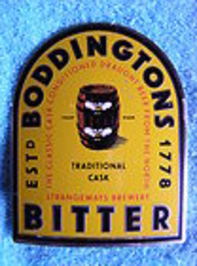Will Boddingtons get the bullet?
Added: Monday, June 25th 2012
Boddingtons Bitter, one of the iconic cask beers of North-west England, is no longer in production and its future is in doubt. The brand is owned by AB InBev, the world’s biggest global brewer, which acquired Boddingtons when it took over Whitbread’s brewing interests in 2000.
Production of Boddingtons in cask-conditioned form was handed to Hydes of Greater Manchester but the contract has expired and Hydes is no longer brewing the beer. Hydes plans to move to a new site and will brew only its core brands for its tied estate. It has sold its free trade business to Thwaites of Blackburn and is no longer carrying out contract brewing.
AB InBev tells me it’s looking for a new company to take on Boddingtons in cask form. If it’s unsuccessful, the brand will die. Currently, the beer is no longer being supplied to pubs and its lack of availability will create a further downward spiral of demand.
The decline and possible loss of cask Boddingtons is a tragedy. It was one of the beers that helped fuel the “real ale revolution” of the 1970s. The founder members of the Campaign for Real Ale came from the North-west and for them “Boddies” was a beer to measure all others against. The first edition of the CAMRA Good Beer Guide in 1974 said succinctly “one of the best”. It was a distinctive beer, as pale as lager and with a modest strength of 3.8%, but it had a wonderfully complex character of juicy malt and spicy and peppery hops from traditional Fuggles and Goldings.
The first time I drank it, in a pub in Hyde, Cheshire, I thought I had died and gone to heaven: I couldn’t believe beer could taste that good.
The Strangeways Brewery in Manchester, close to the infamous prison of the same name, was founded in 1778. Henry Boddington, from Oxfordshire, joined the company in 1832 in a humble role but by 1853 he was the sole owner and he boosted production to 100,000 barrels a year – a vast volume for a brewery in a major industrial city with many competitors.
The creation of national brewing groups in the 1960s led to a wave of takeovers and mergers. In 1969, Allied Breweries – Ansells, Ind Coope and Tetley – launched a hostile takeover for Boddingtons. It was rejected by the Boddington family and their shareholders: one shareholder memorably dismissed Allied as producing beer “that was all wind and piss, like a barber’s cat” (quoted in Christopher Hutt’s Death of the English Pub).
But Boddingtons itself went on the takeover trail. It bought the Oldham Brewery in 1982 and Higson’s of Liverpool in 1985. The size and success of the company brought it to the attention of Whitbread, one of the most acquisitive of the national brewers. In 1989 the Boddington family agreed to sell the brewery to Whitbread for £50.7 million.
Whitbread took the beer out of its North-west confines and turned it into a national brand. Production was expanded to 850,000 barrels a year and by 1994 it was the fourth biggest cask ale brand in Britain. But Whitbread debased the currency of the beer by producing it in keg and canned forms and started to lose interest in the cask version.
In 2000 Whitbread left brewing and its plants were acquired by the Belgian group Interbrew, best known for Stella Artois lager. Interbrew is now AB InBev and has no interest in what it deems to be “low volume” beers. Draught Bass has been hived off to Marston’s and Flowers Original and IPA to Brains of Cardiff.
Brains told me it has no interest in taking on cask Boddingtons as the volumes are now believed to be extremely small. The chairman of a large regional brewing group said he would prefer to concentrate on his own brands.
If AB InBev had an ounce of marketing sense it would have seen the potential of Boddingtons at a time when golden ales are enjoying a great surge in sales. But the global giant prefers to spend millions promoting such nonsenses as Stella Artois Cider – sorry, Cidre – and allows Boddies to wither on the hop bine.
Those of us who took up the battle for cask beer in the 1970s can only weep at the almost certain loss of a great ale.









